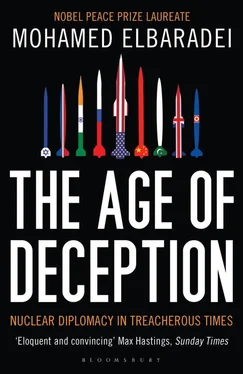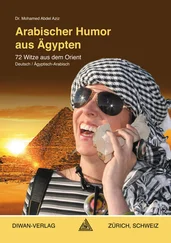The use of centrifuges is just one of several techniques for enriching uranium.
Soon after the bombing commenced, on January 16, 1991, President George Herbert Walker Bush said the following on national television: “We are determined to knock out Saddam Hussein’s nuclear bomb potential.” Quoted in David Albright and Mark Hibbs, “Iraq and the Bomb: Were They Even Close?” Bulletin of the Atomic Scientists, March/April 1991.
“Early Western Assessments: What Did We Know and When Did We Know It?” Federation of American Scientists, retrieved at www.fas.org/nuke/guide/iraq/nuke/when.htm.
A good example was that of William Safire, claiming in the New York Times that, among other things, Iraq’s scientists were enriching uranium with twenty-six centrifuges. Referenced in David Albright and Mark Hibbs, “Hyping the Iraqi Bomb,” Bulletin of the Atomic Scientists, March/April 1991.
Iraq was known to have used chemical weapons during the 1980–1988 Iraq-Iran War.
“Reflections on Establishing and Implementing the Post–Gulf War Inspections of Iraq’s Weapons of Mass Destruction Programs,” transcript of an address by Robert Gallucci at the Institute for Science and International Security, June 14, 2001.
Gallucci, “Reflections” address.
The U.S.-led effort to develop the atomic bomb during World War II.
Ghaffour would later become the Iraqi minister of higher education and scientific research.
David Kay would later be appointed by President Bush, in 2003, to head the Iraq Survey Group.
Gallucci, “Reflections” address.
“The Iraqi Bomb,” New Yorker, February 1, 1993.
Robert Gallucci’s description of this particular inspection makes it clear that, while it had to be an IAEA-led inspection, only three of the forty-two team members were IAEA inspectors. The others included individuals with “special skills,” whose expertise was not in nuclear science or WMD at all; the implication is that they were assigned to the team to ensure the documents would be retrieved by whatever means needed. As Gallucci said, “The team was very, very special.” See Gallucci, “Reflections” address.
According to Gallucci, “I was not confident about my interlocutor in New York, so I decided to go through the State Department.” Gallucci, “Reflections” address.
The removal from Iraq of the clandestinely produced six grams of plutonium had already been arranged as part of the fifth IAEA inspection, in mid-September.
Saddam Hussein had long been viewed as an asset by the United States, Europe, and the Arab States, who had encouraged, supported, and financed his 1980–1988 war with Iran, as a way to “contain the Iranian revolution.” This of course had added to Iran’s distrust and resentment of the West, and is viewed by many as having been the genesis of the Iranian nuclear program, following Iraq’s use of chemical weapons during the Iran-Iraq War.
The focus of IAEA verification at the time was large industrial countries, such as Japan, Germany, Italy, and Canada, since most developing countries did not have significant nuclear infrastructure.
This is often a point of confusion. By joining the IAEA (becoming a “Member State”), a country pledges to uphold the principles of the IAEA statute and thus gains access to proliferations discussions. However, this does not obligate that country to accept IAEA verification of its nuclear material and facilities. That legal obligation comes with joining the Nuclear Non-Proliferation Treaty and, pursuant to the treaty, concluding a comprehensive safeguards agreement with the IAEA.
While it is compulsory for countries party to the NPT to conclude safeguards agreements with the IAEA, the Agency has no power to penalize those who fail to do so.
Barton Gellman, “U.S. Spied on Iraq Via U.N.,” Washington Post , March 2, 1999. A similar story appeared in the Boston Globe.
Ritter would later become known for his criticism of U.S. foreign policy. In March 2003, he would argue publicly that Iraq possessed no significant WMDs.
“The Lessons and Legacy of UNSCOM: An Interview with Ambassador Richard Butler,” Arms Control Today 29, no. 4 (June 1999).
S/1997/301, report by the executive chairman of UNSCOM, April 11, 1997. In his conclusions to this report, Ekeus wrote, “The accumulated effect of the work that has been accomplished over six years since the ceasefire went into effect, between Iraq and the Coalition, is such that not much is unknown about Iraq’s retained proscribed weapons capabilities.” Ekeus wrote further that the efforts from October 1996 to early 1997 were focused on getting the “major outstanding issues to a manageable quantity” and cited overall satisfaction with missile and chemical weapons issues. He noted that Iraq’s presentation in the biological weapons area remained “rather chaotic.”
In Butler’s book Saddam Defiant: The Threat of Weapons of Mass Destruction, and the Crisis of Global Security (New York: Weidenfeld and Nicolson, 2000), he says it was U.S. ambassador Peter Burleigh, acting on instructions from Washington, who suggested that Butler pull the UNSCOM team from Iraq in order to protect them from the forthcoming U.S. and British air strikes (p. 224).
In diplomatic parlance, a non-paper is a written proposal or set of ideas put forward informally, without commitment and often without formal attribution, as a way of engendering discussion or suggesting a basis for negotiation.
United Nations Monitoring, Verification and Inspection Commission, created by Security Council Resolution 1284 in December 1999.
Following Ceauşescu’s ouster, the new government requested a special inspection to show that, under Ceauşescu’s rule, Romania had reprocessed one hundred milligrams of plutonium without informing the IAEA.
The shorthand reference to the five permanent members of the UN Security Council—China, France, Russia, the United Kingdom, and the United States—is the P-5. Not coincidentally, these also are the five countries named in the NPT as the possessors of nuclear weapons.
Rice at the time was the national security adviser. Wolfowitz was the deputy secretary of defense. Libby was the chief of staff to Vice President Cheney.
The United Nations Command (Korea) of the early 1950s was a command structure that combined military forces from multiple countries, to provide assistance to South Korea in repelling North Korean hostilities. Security Council Resolution 84 recommended that UN member countries contributing troops and other assistance make them “available to a unified command under the United States of America.”
An underlying viewpoint was reappearing here: certain political factions in the United States have often viewed the United Nations as merely a tool, to be used when convenient, as a way to make U.S.-driven actions more palatable to other countries, but to be discarded or circumvented when UN objectives are not in U.S. interests. These individuals or groups tend not to view the United States as one UN member among many—nor really as a member of the community of nations—but rather as a sort of patron or custodian of the UN, exempt from the rules it helps set for others. This viewpoint was perhaps most strongly in evidence during the George W. Bush administration.
Читать дальше












